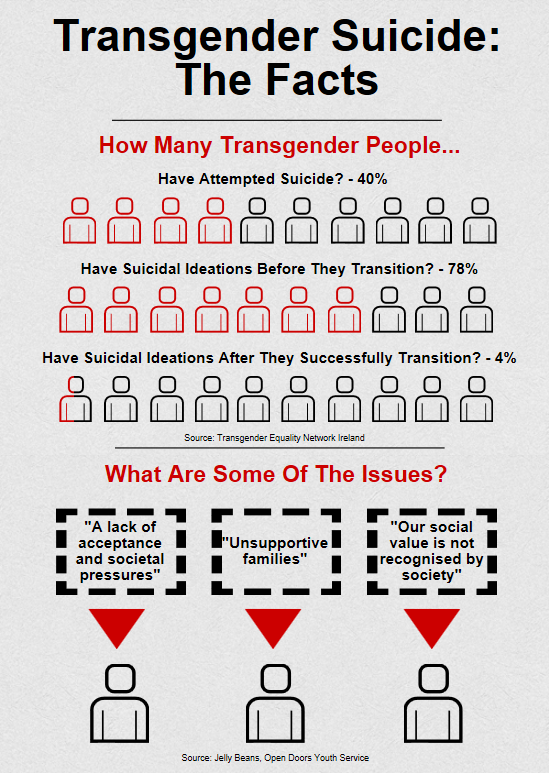
The 40-percent
FOR Lisa Mullin, the depression caused by attempting to come to terms with being transgender was overwhelming.
“I couldn’t see a reason to live,” she said. “There was no point in living.”
“I used to do lists of reasons I should live, and reasons I should die. And the reasons I could put up for reasons why I should live were very short indeed.”
“I slipped into the symptoms of that twisted reality until all I could see was suicide,” she said. “And then it was just a question of how I was going to do it.”
“And, of course, at that particular time I couldn’t tell any of my friends because I was scared they’d all leave me. “
Ms Mullin is not alone, as a recent study from Transgender Equality Network Ireland suggests that around 40-percent of transgender people have attempted suicide.
What’s more, further studies suggest that 78-percent of transgender people have suicidal ideations before they transition.
Julie Peters, a trans woman who also suffered from depression, said she struggled for a long time to come to terms with her gender identity.
“When I first became aware that I was different, it seemed to me the only options I had were to call myself a sinner, or to call myself mentally ill.”
“Neither of those really appealed to me,” she said.
“When you start to allow yourself to take on a label like that, you end up with a lot of internalised transphobia.”
Sally Goldner, Executive Director of Transgender Victoria – an LGBTIA advocacy group – said societal attitudes need to change before these issues will be resolved.
“While all around Australia there is an increase in positive societal attitudes,” she said. “There’s still not enough support for people as they emerge.”
“Adding that in with the distress of trying to be someone you’re not on such an important critical aspect of self-identity.”
In particular, she said the lack of appropriate professional medical support for transgender people is causing serious damage to the community.
“Really poor lack of medical support is really a big issue,” she said. “There are long delays at the two publically funded Victorian transgender clinics.”
“There are few trans health professionals outside those public clinics who are knowledgeable and sensitive towards trans issues,” she said.
“This lack of support is certainly harming people.”
Damien Riggs, Associate Professor of Social Work at Flinders University, recently completed a study into healthcare provision for trans people in Australia which found the services lacking.
“We know that these things happen. We know mental healthcare professionals are not properly skilled.”
He said much more works needs to be done to bring this provision of care up to an acceptable standard.
“That requires more training, more up-skilling, and it requires more services to be available,” he said.
“But even if all of that was the case, it’s still going to be the case that society at large holds discriminatory attitudes towards transgender people.”
“You can access all of the support you want,” he said. “But if you’re still then walking down the street and people are harassing you and you’re still being discriminated against, then that’s the second part of it as well.”
Gina Mather, president of the Australian Transgender Support Association of Queensland, said her organisation has suffered due to a lack of government funding.
“This state government can help by giving us some financial backing,” she said.
“We can’t do what we want to do with regards to going out and about. It’s just disgusting the way the government’s treated us.”
Ms Goldner said the government needs to step up to the plate when it comes to these issues.
“They need to be doing more than what they have been,” she said.
“We’ve got a right to healthcare that ends up with better holistic health and human dignity and respect.”
“Not only do people not come out as trans, they then disengage from the health system altogether,” she said. “They won’t go back to a GP.”
“This is massively hurting the health budget, and hurting people both physically and psychologically. Everyone’s losing, really, under the current system.”
Mr Riggs said the government also needs to streamline the processes transgender people go through to receive treatment.
“There’s contradictory laws between federal and state, so I think they definitely need to brought in line.”
“If you live in Brisbane, and you want to access surgery, you can’t do that in Brisbane, but they will fly you down to Melbourne to Monash to have that done, and it will be paid for.”
“But that’s not widely known,” he said. “So it is about how this information is made available.”
For Lisa Mullin, a harmful experience with a GP insensitive to transgender issues served to worsen her already fragile condition.
“I remember walking out of his office, and walking back to my car and thinking ‘my life’s over.’”
“There’s nobody there for you, nobody helps you, and nobody gives you a cuddle, puts their arms around you, and says ‘you’re okay,’” she said.
After visiting a health professional trained in dealing with gender dysphoria, Ms Mullin said she has been able to properly work towards her transition.
“I woke up one day, and I said to myself ‘I’ve gone full time.’ It just happened naturally, and that’s probably for the best.”
“I can talk about my suicidal thoughts now, but even a year ago I couldn’t talk about them,” she said.
“It’s been a long time healing. I’m working through my transition, and feeling a lot better about myself doing that.”
If you or someone you know is struggling with depression please seek help. Call Beyond Blue on 1300-22-4636 or visit http://www.beyondblue.org.au
This post was originally published on Golden-I UQ 2014.
